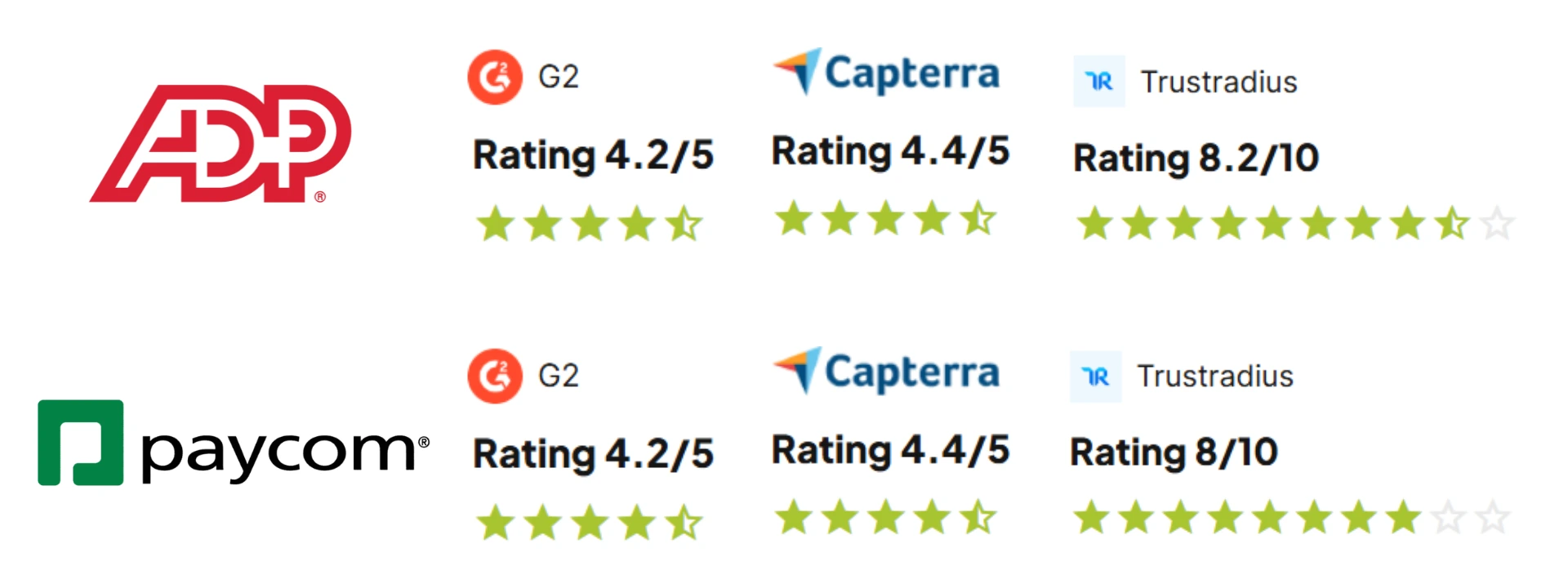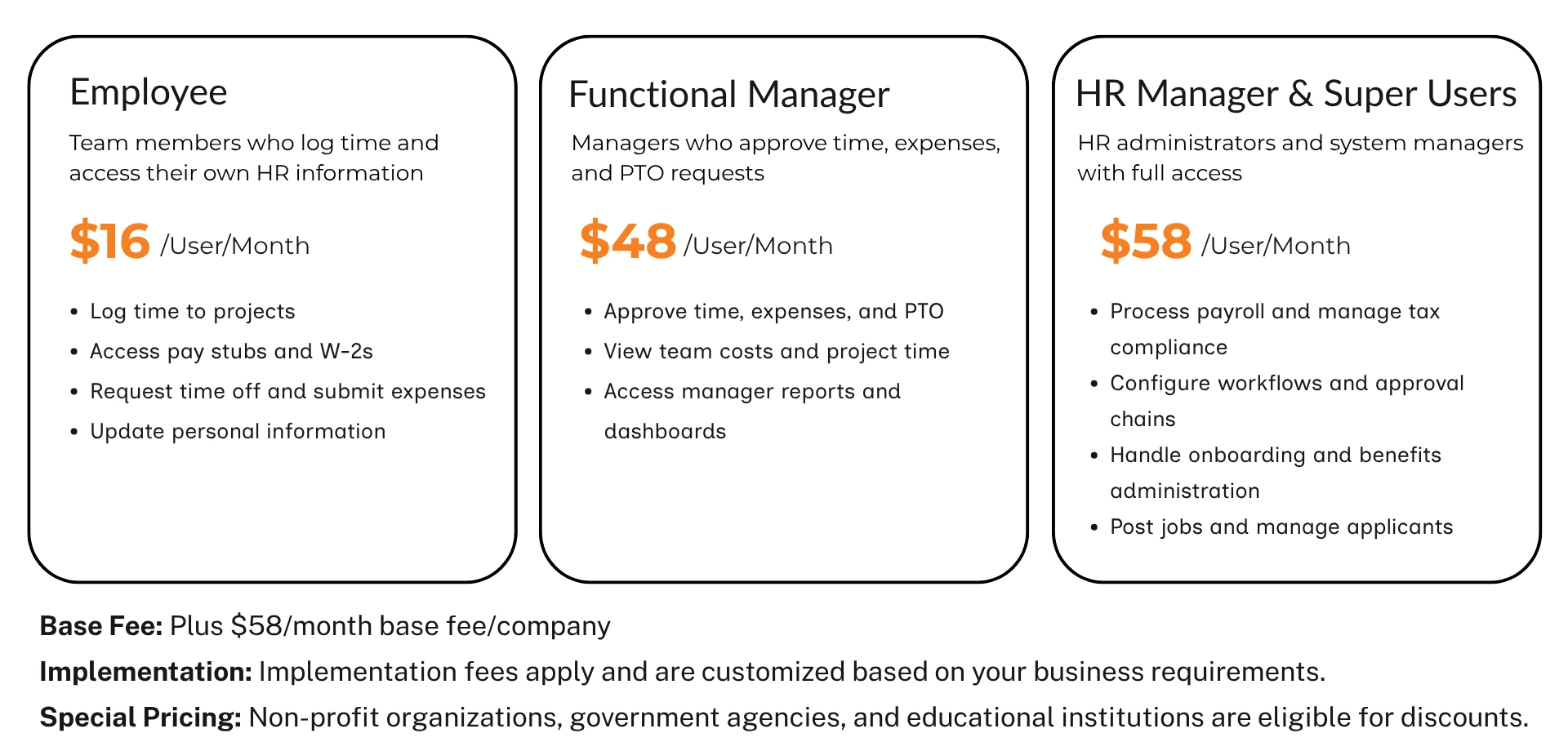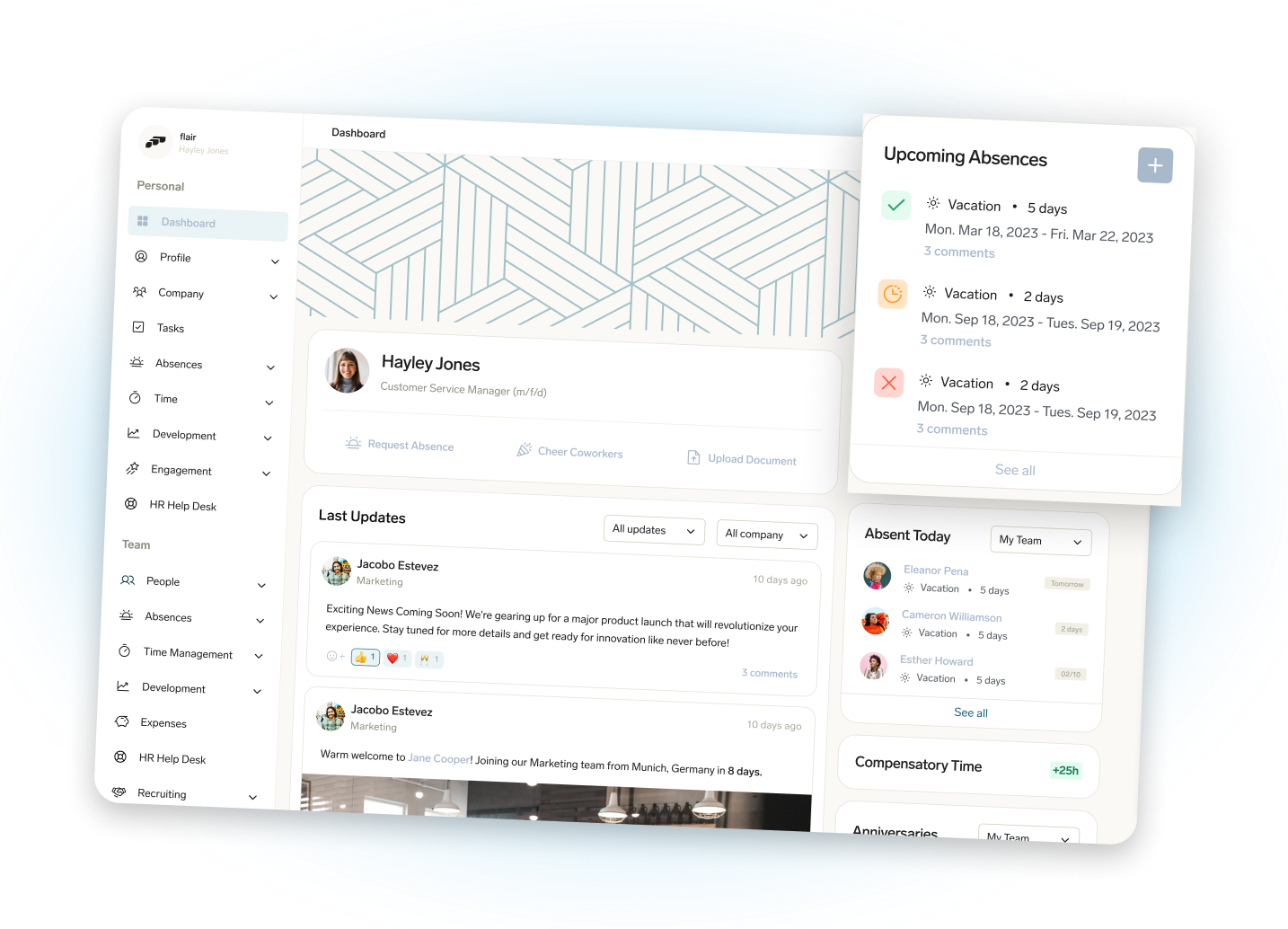
ADP vs Paycom: Which Payroll Platform Fits Your Business? (2025)
.webp)
Quick Comparison Summary
ADP works best for companies wanting flexible, modular HR solutions that integrate with hundreds of third-party applications and need global payroll capabilities. Paycom fits businesses prioritizing employee self-service automation where staff verify their own payroll data through the Beti system. Still deciding? Read our detailed comparison below, or discover a third option that takes a different approach entirely.
Choosing the right payroll and HR software solution can make or break your company's operations. Whether you're managing a growing small business or overseeing hundreds of employees across multiple states, you need a platform that handles payroll processing accurately while supporting your broader workforce management goals.
ADP and Paycom represent two distinct approaches to HR technology. ADP brings seven decades of experience with modular solutions that scale from small businesses to global enterprises. Paycom focuses on unified automation where employees take ownership of their own data through guided self-service tools.
Both platforms handle core HR functions like payroll processing, benefits administration, time tracking, and compliance management for U.S.-based employers. The question isn't whether they work - it's which philosophy fits your organization better.
Key Takeaways:
- Who it's for: ADP fits businesses wanting modular flexibility and extensive integrations. Paycom works for companies prioritizing employee-driven automation.
- Time-to-value: ADP: 4-8 weeks depending on modules selected. Paycom: 2-3 months for full implementation.
- TCO: ADP costs $23-30 per employee monthly plus implementation fees. Paycom ranges $25-36 per employee monthly with higher setup costs.
ADP Quick Summary:
- Strength: Modular solutions that scale from small business to enterprise
- Integration: Open APIs plus 800+ third-party connections via marketplace
- Custom work: Extensive configuration options with partner ecosystem
- Cost: $23-30 per employee monthly, 10-20% implementation fee
Pricing Overview
According to independent industry analysis, ADP Workforce Now costs $23-30 per employee per month depending on company size, selected modules, and contract length. The platform uses tiered packaging:
Select Package: Basic payroll and HR management
Plus Package: Adds benefits administration and enhanced reporting
Premium Package: Includes time and attendance with workforce management tools
Implementation fees typically run 10-20% of annual software costs. Companies can add modules like talent acquisition ($15+ per employee), performance management, and advanced analytics as needed.
Pricing estimates verified November 2025, subject to change. Visit ADP's website for current rates.
Feature Breakdown
ADP Workforce Now covers the full HR lifecycle through its modular approach. Core payroll processing includes automated tax filings across all 50 states, direct deposit, wage garnishment handling, and multi-state compliance. The benefits administration module connects with major insurance carriers and automates enrollment workflows.
Time tracking integrates with various clock systems including biometric options and mobile check-ins. The talent management suite handles recruiting through ZipRecruiter integration, performance reviews, and learning management. Advanced features include workforce analytics, succession planning, and global payroll for international operations.
Our Take
ADP excels when businesses need proven stability with room to grow. The modular design means you're not paying for unused features, but can add capabilities as requirements evolve. Integration options solve the "best of breed" challenge - you can keep existing tools while centralizing data. However, the complexity can overwhelm smaller teams, and pricing transparency leaves something to be desired- you need to carefully review of all potential fees and add-ons to understand your total cost of ownership.
Paycom Quick Summary:
- Strength: Unified single-database system with employee self-service automation
- Integration: Limited third-party connections, internally-built tools only
- Custom work: Standardized workflows with minimal customization options
- Cost: $25-36 per employee monthly, 15-30% implementation fee
Pricing Overview
Industry sources report Paycom costs $25-36 per employee per month for its full HCM platform, with pricing varying by company size and feature requirements. Unlike many competitors, Paycom charges per payroll run rather than unlimited processing.
Implementation fees range from 15-30% of annual software costs, generally higher than ADP's model. The single-platform approach means all features come as a package rather than modular add-ons.
Pricing estimates verified November 2025, subject to change. Contact Paycom for current rates.
Feature Breakdown
Paycom's unified database architecture ensures all HR data flows through connected modules without integration delays. The Beti system guides employees through reviewing and approving their own payroll before processing, shifting responsibility from HR to individual workers.
Core capabilities include payroll processing with automated tax compliance, benefits administration with employee self-enrollment, and time tracking through mobile apps. The talent acquisition module covers applicant tracking, background screening, and onboarding workflows. Performance management, learning management, and compensation planning round out the full suite.
Our Take
Paycom works well for organizations ready to embrace employee-driven processes. The single database eliminates data sync issues common with multi-vendor solutions, and the mobile-first approach empowers workers to manage their own information. Beti's payroll verification can reduce errors while teaching employees about deductions and benefits. The trade-off comes in flexibility - you're committing to Paycom's way of working with limited ability to integrate preferred third-party tools.
At a Glance
ADP built a flexible ecosystem designed to integrate with existing business tools and scale across company sizes. Paycom created a unified system focused on employee self-service with minimal external dependencies. ADP supports global operations while Paycom concentrates on U.S. markets. Both handle multi-state tax compliance and federal reporting requirements like 941/940 filings, state unemployment insurance (SUI), local tax compliance, and year-end W-2 and 1095-C reporting.
ADP vs Paycom: Payroll Processing and Tax Compliance
ADP handles payroll across all 50 states with automated tax filings and compliance support. The system accommodates complex pay schedules, multiple jobs per employee, and industry-specific requirements like union contracts or prevailing wage calculations. Integration with ADP's tax services provides penalty protection and dedicated support for tax questions.
Paycom's Beti system requires employees to review and approve their own payroll data before processing, creating built-in verification. The platform automatically calculates federal, state, and local taxes while handling garnishments and other deductions. Tax filing happens automatically with compliance reporting included.
Winner: ADP - Better for companies with complex pay structures, multiple locations, or industry-specific requirements. Paycom wins for businesses wanting employee ownership of payroll accuracy.
HR Management and Employee Records
ADP stores employee data in a central HRIS with configurable workflows for onboarding, role changes, and terminations. Document management supports bulk uploads with audit trails. Integration capabilities mean employee changes can trigger updates in connected systems automatically.
Paycom's single database ensures employee information updates across all modules instantly. The self-service portal lets employees update personal information, emergency contacts, and banking details without HR involvement. Digital document storage includes e-signatures and automated compliance tracking.
Winner: Paycom - Unified data flow eliminates sync delays and reduces manual data entry across modules.
Time Tracking and Scheduling
ADP offers multiple time collection methods including web-based timesheets, mobile apps, and integration with existing time clocks. Geofencing prevents early clock-ins, and biometric options reduce buddy punching. Scheduling tools help manage shifts with overtime alerts and labor cost tracking.
Paycom's mobile app handles time entry, schedule viewing, and shift swapping through employee self-service. Managers can approve timesheets and monitor labor costs in real-time. Integration with payroll means time data flows directly to pay calculations.
Winner: ADP - More flexible time collection options and better integration with third-party scheduling systems.
Benefits Administration
ADP connects with major insurance carriers through its benefits network. Employees enroll through decision support tools that recommend plans based on individual needs. Carrier feeds automate eligibility updates and premium changes.
Paycom handles benefits enrollment through guided self-service with real-time eligibility verification. The system calculates employee contributions and integrates with payroll deductions automatically. Benefits changes trigger updates across all connected modules.
Winner: Paycom - Better employee experience with guided enrollment and real-time integration with payroll.
Applicant Tracking and Performance Management
ADP's talent acquisition module connects with ZipRecruiter for job posting and includes background screening, interview scheduling, and onboarding integration. Performance management supports goal cascading, review cycles, and succession planning with configurable workflows.
Paycom provides end-to-end recruiting from job posting through onboarding in the same database as HR and payroll. Performance management includes goal setting, review cycles, and talent analytics. The unified system means new hire data flows directly into payroll and benefits.
Winner: Paycom - Unified database provides better data flow from recruiting through employee lifecycle management.
Integration Capabilities
ADP offers open APIs plus over 800 marketplace integrations covering accounting, CRM, and specialized HR tools. The partner network includes major platforms like Salesforce, NetSuite, and QuickBooks. Custom integrations are possible through ADP's development resources or certified partners.
Paycom intentionally limits external integrations to maintain data integrity in their single-database approach. Basic accounting exports are available, but the platform expects organizations to use Paycom's built-in tools rather than third-party solutions.
Winner: ADP - Extensive integration options support "best of breed" tool strategies and existing technology investments.
Reporting and Analytics
ADP provides standard reports plus custom report building with drill-down capabilities. Workforce analytics include benchmarking against industry peers and predictive insights for turnover and engagement. Data can export to business intelligence tools for advanced analysis.
Paycom's unified database enables real-time reporting across all modules without data consolidation delays. Standard reports cover payroll, HR, and talent management with customizable dashboards. Advanced analytics help identify trends in turnover, performance, and compensation.
Winner: Paycom - Real-time reporting across unified data provides better insights without manual data consolidation.
User Interface and Learning Curve
ADP's interface varies by module but generally follows web-based standards. The mobile app received recent improvements with better employee self-service capabilities. Training resources include online courses, certification programs, and dedicated support teams.
Paycom's mobile-first design emphasizes employee self-service with consistent navigation across modules. The interface guides users through complex processes with contextual help. However, the employee-driven model requires more initial training to change HR workflows.
Winner: Paycom - More intuitive mobile experience and consistent interface design across all modules.
ADP vs Paycom: Pricing and Total Cost of Ownership
ADP charges $23-30 per employee monthly with modular pricing that lets companies pay only for needed features. Implementation fees run 10-20% of annual costs. Additional charges apply for premium support, advanced features, and some integrations.
Paycom costs $25-36 per employee monthly with all features included in a single package. Implementation fees are higher at 15-30% of annual costs. The per-payroll pricing model can increase costs as payroll frequency grows.
Winner: ADP - More predictable pricing model and better value for companies not needing all features.

- G2: 4.2/5 based on 1,400+ reviews (November 2025)
- Capterra: 4.4/5 based on 1,200+ reviews
- TrustRadius: 8.2/10 based on 900+ reviews
Positive: "Comprehensive features for growing companies" - HR Manager
Critical: "Implementation was more complex than expected" - Operations Director
- Paycom: G2: 4.2/5 based on 900+ reviews (November 2025)
- Capterra: 4.4/5 based on 800+ reviews
- TrustRadius: 8/10 based on 400+ reviews
Positive: "Mobile app makes employee self-service easy" - Small Business Owner
Critical: "Limited integration options compared to competitors" - IT Director
Volume of reviews favors ADP; user satisfaction scores are comparable.
Ratings and quotes from G2, Capterra, TrustRadius as of November 2025. Quotes shortened for clarity.
Both ADP and Paycom solve payroll and HR challenges, but neither is built natively on the world's leading business process management software - Salesforce. Here's how Sunrise HCM differs - and why being built on Salesforce matters:
Built on Salesforce, No Salesforce Required
Sunrise HCM runs on Salesforce. You don't need an existing instance or separate license. The platform infrastructure is included in your subscription. You're not purchasing anything else from Salesforce.
Your data lives in one database that's already proven in banks, hospitals, and government agencies. Security updates happen automatically. Backups run continuously across multiple locations. The system grows with your company, all managed infrastructure you never touch.
Already using Salesforce? Your costs will be lower since you already have the platform infrastructure. Each Sunrise HCM user price includes a Salesforce platform license, but we'll discount your pricing based on how many users already have access.
Enterprise Security by Design
SOC 2 Type II compliance comes standard. Encryption in transit and at rest. Role-based access control. Multi-factor authentication. Continuous monitoring and backups. You get Fortune 500-level security, managed by one of the most trusted platforms on the planet, without handling infrastructure yourself.
The Salesforce platform has been battle-tested for 20+ years. Banks use it. Hospitals use it. Government agencies use it. When we build on this foundation, you get all that protection automatically.
Real-Time Data Integration
Single entry of time flows to payroll and billing. HR changes update downstream instantly. Your payroll data, HR records, time tracking, expense information, and billing all live in the same place. Change an employee's role in HR and it updates across time tracking and billing automatically. No export files. No overnight syncs. No wondering which system holds the truth.
The platform connects to thousands of business systems through proven open API frameworks. Connect your accounting software, CRM tools, expense management platforms, or custom applications. Real-time data flow eliminates sync delays and manual exports. You're not locked into our ecosystem. The API architecture is industry-standard, so developers already know how to work with it.
True Scalability
Multi-tenant architecture means you're always on the latest version. Three releases per year with new features. Zero downtime. No compatibility issues. Everyone's on the same version.
Updates happen while you work. This quarter's feedback becomes next quarter's features. No upgrade fees. No version hell.
U.S.-Based Support Included
Every client gets a dedicated U.S.-based relationship manager and a designated backup. No extra fees for premium support tiers. No offshore call centers. No wondering who to contact when you need help.
Transparent Pricing
- $16 per employee per month
- $45 per functional manager per month (employees who review and approve time and expenses)
- $58 per HR Manager per month (HR administrators and power users)
- $58 base fee per month
Everything included: payroll processing, tax filing, W-2s, HR management, time tracking, expense management, and billing. No per-payroll fees. No transaction fees. No surprise charges.
We also offer discounted pricing for nonprofits, government organizations, and educational institutions.

When Sunrise HCM makes sense:
- You need strong integration capabilities with other business systems
- You want enterprise security without enterprise complexity
- You value predictable, transparent pricing
- You want payroll and billing in one system
When to stick with ADP or Paycom:
- You need to pay employees in multiple countries
- You prefer ADP's modular flexibility and extensive marketplace
- You want Paycom's employee self-service automation model
Implementation timeline: The system is generally set up within 2-4 weeks. We run payroll in parallel for 1-2 cycles to ensure everything matches your expectations before going live.
Contact us to see how payroll, HR, time, and billing work together in one system.
Q: Can ADP or Paycom integrate with Salesforce automatically? A: ADP offers Salesforce connections through its marketplace, but requires middleware for real-time sync. Paycom provides limited third-party integrations. Sunrise HCM runs natively on Salesforce, so data syncs instantly without middleware.
Q: How long does implementation take? A: ADP: 4-8 weeks depending on modules and complexity. Paycom: 2-3 months for full implementation and training. Sunrise HCM: 8-12 weeks including configuration and parallel payroll testing.
Q: Which platform offers better customer service? A: ADP provides 24/7 support but quality varies due to large scale operations. Paycom assigns dedicated specialists with phone support during business hours. Sunrise HCM provides every client with a U.S.-based relationship manager and designated backup at no extra cost. We don't charge for premium support tiers.
Q: Can employees access their information on mobile devices? A: Both platforms offer mobile apps. Paycom's mobile-first design allows complete task completion on phones. ADP's mobile app covers essential functions but some advanced features require desktop access. Both allow pay stub viewing, time off requests, and personal information updates.
Q: Which handles multi-state payroll better? A: Both platforms process payroll across all 50 states with automated tax filings. ADP has stronger global capabilities for international operations. Paycom focuses on U.S. domestic payroll. Both handle reciprocity agreements and multi-state compliance requirements.
Q: What about integration with accounting software? A: ADP integrates with QuickBooks, NetSuite, Sage, and hundreds of other accounting platforms through its marketplace. Paycom offers basic GL exports but limited accounting integrations. Sunrise HCM provides real-time integration with major accounting systems through Salesforce's API framework.
Q: Are there discounts available for nonprofits or government organizations? A: Yes. Sunrise HCM offers discounted pricing for nonprofits, government organizations, and educational institutions. Contact us to learn about pricing specific to your organization type.
Q: Which platform is better for employee self-service? A: Paycom excels at employee self-service with its Beti system requiring workers to verify their own payroll data. ADP provides standard employee portals with good mobile access. Both allow employees to update personal information, request time off, and access pay documents.
Q: How do implementation fees compare? A: ADP charges 10-20% of annual software costs for implementation. Paycom charges 15-30% of annual costs. Sunrise HCM includes implementation in the fixed fee structure with specific customizations included (6 business process automations, 3 custom user interface pages, 3 dashboards, 10 reports).
Q: Can either platform handle expense management? A: Both platforms include expense management features. Paycom integrates expenses with payroll for automatic reimbursement. ADP offers expense tracking with approval workflows. Sunrise HCM connects expenses to project billing and payroll in the same system.
Q: Which is better for performance management? A: ADP offers comprehensive performance management with goal cascading and succession planning. Paycom provides performance reviews and talent analytics in the unified database. Both support review cycles, but ADP has more advanced talent management features.


Ready to eliminate payroll fees, and simplify HR processes?
Discover how Sunrise HCM helps you automate payroll, HR, and billing with one secure and powerful Salesforce-native platform.




